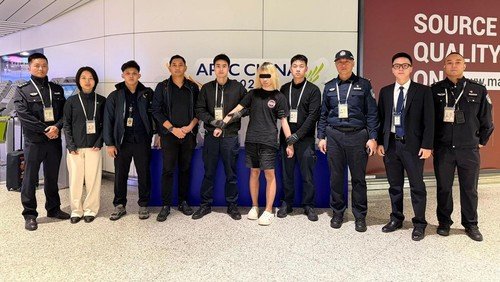
Immigration authorities in Bali have deported a Brazilian national, identified as AGA, 34, following accusations of her involvement in prostitution while on a tourist visa.
AGA, who said that she worked as a lawyer in Brazil, was escorted out of Indonesia through Ngurah Rai International Airport on Thursday, November 28, after being detained at the Denpasar Immigration Detention Center (Rudenim).
Digital Surveillance Leads to Arrest
AGA entered Indonesia on October 25, 2024, using a 30-day tourist visa, stating that her intention was to vacation in Bali. However, her activities raised suspicions during a digital surveillance operation conducted by immigration officers, which uncovered communications tied to prostitution.
She was arrested on November 12 at a villa in Seminyak, Kuta.
During questioning, AGA admitted to engaging in prostitution to cover her living expenses in Bali, earning Rp 7.8 million per engagement (USD 500).
According to her testimony, she coordinated her services through WhatsApp with a man claiming to be from Singapore, though she stated she did not know him personally.
“Violations of residence permits and involvement in illegal activities such as prostitution cannot be tolerated,” said Gede Dudy Duwita, head of Rudenim Denpasar.
Authorities Crack Down on Illegal Activities
The deportation is part of a broader effort to enforce immigration laws and maintain public order in Bali. Pramella Yunidar Pasaribu, the head of the Bali Regional Office of the Ministry of Law and Human Rights, stressed the government’s commitment to keeping the island safe.
“We are committed to keep Bali safe and civil,” Pramella said. “We will not hesitate to take firm actions against violations to immigration laws.”
AGA’s name has been added to the immigration blacklist, initially barring her from reentering Indonesia for six months. This period may be extended depending on the severity of the case. Authorities also noted that lifetime bans are possible for individuals deemed to pose a threat to public order.
Prostitution Remains Illegal in Indonesia
In Indonesia, prostitution occupies a legal gray area rather than being outright criminalized.
While widely condemned in the Muslim-majority nation, legal actions tend to focus on related offenses such as public indecency or human trafficking, rather than on sex work itself. This nuanced stance allows aspects of the trade to operate discreetly, often facilitated through digital platforms and private arrangements
In the case of AGA, the Brazilian lawyer deported for alleged involvement in prostitution, immigration authorities used Indonesia’s strict visa and public order laws to take action. By engaging in activities deemed illegal under Indonesian social norms and public order regulations, she was deemed to be in violations of the conditions of her tourist visa.
Officials emphasized that such violations, particularly involving foreigners, are intolerable, as they risk undermining public safety and Bali’s image as a global tourist destination.
The case highlights how Indonesia’s legal framework, though ambiguous on prostitution itself, enables swift enforcement against foreign nationals through immigration laws when such activities are discovered










